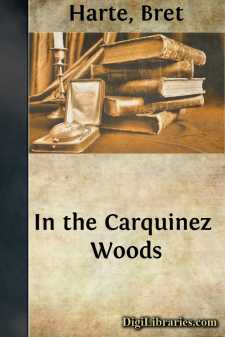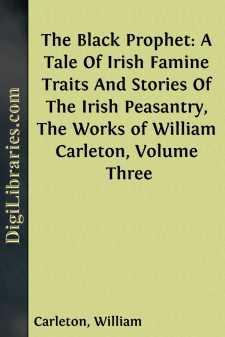Literary Collections
- American 84
- Ancient, Classical & Medieval 14
- Asian 1
- Australian & Oceanian 1
- Canadian 55
- Continental European 121
- English, Irish, Scottish, Welsh 179
- Essays 160
- General 24
- Letters 46
- Middle Eastern 1
Literary Collections Books
Sort by:
by:
Bret Harte
CHAPTER I. The sun was going down on the Carquinez Woods. The few shafts of sunlight that had pierced their pillared gloom were lost in unfathomable depths, or splintered their ineffectual lances on the enormous trunks of the redwoods. For a time the dull red of their vast columns, and the dull red of their cast-off bark which matted the echoless aisles, still seemed to hold a faint glow of the dying...
more...
CHAPTER I INTRODUCES THE ADMIRAL When Dick Naseby was in Paris he made some odd acquaintances, for he was one of those who have ears to hear, and can use their eyes no less than their intelligence. He made as many thoughts as Stuart Mill; but his philosophy concerned flesh and blood, and was experimental as to its method. He was a type-hunter among mankind. He despised small game and insignificant...
more...
by:
William Carleton
CHAPTER I. — Glendhu, or the Black Glen; Scene of Domestic Affection. Some twenty and odd years ago there stood a little cabin at the foot of a round hill, that very much resembled a cupola in shape, and which, from its position and height, commanded a prospect of singular beauty. This hill was one of a range that ran from north to southwest; but in consequence of its standing, as it were, somewhat...
more...
INTRODUCTION Gay's concern in his survey of The Present State of Wit is with the productions of wit which were circulating among the coffee-houses of 1711, specifically the large numbers of periodical essays which were perhaps the most distinctive kind of "wit" produced in the "four last years" of Queen Anne's reign. His little pamphlet makes no pretence at an analysis of true...
more...
CHAPTER ONE Philip Weyman's buoyancy of heart was in face of the fact that he had but recently looked upon Radisson's unpleasant death, and that he was still in a country where the water flowed north. He laughed and he sang. His heart bubbled over with cheer. He talked to himself frankly and without embarrassment, asked himself questions, answered them, discussed the beauties of nature and...
more...
by:
Jack London
It was the end. Subienkow had travelled a long trail of bitterness and horror, homing like a dove for the capitals of Europe, and here, farther away than ever, in Russian America, the trail ceased. He sat in the snow, arms tied behind him, waiting the torture. He stared curiously before him at a huge Cossack, prone in the snow, moaning in his pain. The men had finished handling the giant and...
more...
by:
Charles Cotton
Few things, in comparison of what commonly affect other men, move, or, to say better, possess me: for 'tis but reason they should concern a man, provided they do not possess him. I am very solicitous, both by study and argument, to enlarge this privilege of insensibility, which is in me naturally raised to a pretty degree, so that consequently I espouse and am very much moved with very few things....
more...
CLOCKS. There are two kinds of clocks. There is the clock that is always wrong, and that knows it is wrong, and glories in it; and there is the clock that is always right—except when you rely upon it, and then it is more wrong than you would think a clock could be in a civilized country. I remember a clock of this latter type, that we had in the house when I was a boy, routing us all up at three...
more...
by:
Bret Harte
CHAPTER I. "It blows," said Joe Wingate. As if to accent the words of the speaker a heavy gust of wind at that moment shook the long light wooden structure which served as the general store of Sidon settlement, in Contra Costa. Even after it had passed a prolonged whistle came through the keyhole, sides, and openings of the closed glass front doors, that served equally for windows, and filled...
more...
CONVERSATIONS PARIS, 1851-2. [The coup d'état took place on the 2nd, and Mr. Senior reached Paris on the 21st of December.—ED.] Paris, December 23, 1851.—I dined with Mrs. Grot and drank tea with the Tocquevilles. [1]'This,' said Tocqueville, 'is a new phase in our history. Every previous revolution has been made by a political party. This is the first time that the army has...
more...











